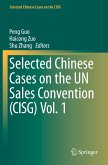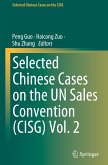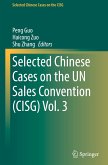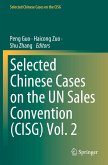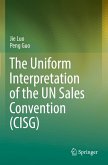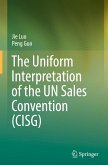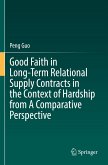Selected Chinese Cases on the UN Sales Convention (CISG) Vol. 1
Herausgegeben:Guo, Peng; Zuo, Haicong; Zhang, Shu
Selected Chinese Cases on the UN Sales Convention (CISG) Vol. 1
Herausgegeben:Guo, Peng; Zuo, Haicong; Zhang, Shu
- Gebundenes Buch
- Merkliste
- Auf die Merkliste
- Bewerten Bewerten
- Teilen
- Produkt teilen
- Produkterinnerung
- Produkterinnerung
This book focuses on Chinese cases on the CISG decided by Chinese courts of all levels, mainly from 1990 to 2005. During this period, the number of cases grew gradually. The total number of cases remained low, the reasons of which might be the following: parties were not familiar with the CISG hence decided to opt out of it; the case collection and report systems in China at that time were not as developed as now rendering many cases inaccessible. This book deals with the cases in the early days of the development of the CISG in China. These cases reflect how People's Court of all levels…mehr
Andere Kunden interessierten sich auch für
![Selected Chinese Cases on the UN Sales Convention (CISG) Vol. 1 Selected Chinese Cases on the UN Sales Convention (CISG) Vol. 1]() Selected Chinese Cases on the UN Sales Convention (CISG) Vol. 1112,99 €
Selected Chinese Cases on the UN Sales Convention (CISG) Vol. 1112,99 €![Selected Chinese Cases on the UN Sales Convention (CISG) Vol. 2 Selected Chinese Cases on the UN Sales Convention (CISG) Vol. 2]() Selected Chinese Cases on the UN Sales Convention (CISG) Vol. 2112,99 €
Selected Chinese Cases on the UN Sales Convention (CISG) Vol. 2112,99 €![Selected Chinese Cases on the UN Sales Convention (CISG) Vol. 3 Selected Chinese Cases on the UN Sales Convention (CISG) Vol. 3]() Selected Chinese Cases on the UN Sales Convention (CISG) Vol. 3104,99 €
Selected Chinese Cases on the UN Sales Convention (CISG) Vol. 3104,99 €![Selected Chinese Cases on the UN Sales Convention (CISG) Vol. 2 Selected Chinese Cases on the UN Sales Convention (CISG) Vol. 2]() Selected Chinese Cases on the UN Sales Convention (CISG) Vol. 2112,99 €
Selected Chinese Cases on the UN Sales Convention (CISG) Vol. 2112,99 €![The Uniform Interpretation of the UN Sales Convention (CISG) The Uniform Interpretation of the UN Sales Convention (CISG)]() Jie LuoThe Uniform Interpretation of the UN Sales Convention (CISG)97,99 €
Jie LuoThe Uniform Interpretation of the UN Sales Convention (CISG)97,99 €![The Uniform Interpretation of the UN Sales Convention (CISG) The Uniform Interpretation of the UN Sales Convention (CISG)]() Jie LuoThe Uniform Interpretation of the UN Sales Convention (CISG)97,99 €
Jie LuoThe Uniform Interpretation of the UN Sales Convention (CISG)97,99 €![Good Faith in Long-Term Relational Supply Contracts in the Context of Hardship from A Comparative Perspective Good Faith in Long-Term Relational Supply Contracts in the Context of Hardship from A Comparative Perspective]() Peng GuoGood Faith in Long-Term Relational Supply Contracts in the Context of Hardship from A Comparative Perspective97,99 €
Peng GuoGood Faith in Long-Term Relational Supply Contracts in the Context of Hardship from A Comparative Perspective97,99 €-
-
-
This book focuses on Chinese cases on the CISG decided by Chinese courts of all levels, mainly from 1990 to 2005. During this period, the number of cases grew gradually. The total number of cases remained low, the reasons of which might be the following: parties were not familiar with the CISG hence decided to opt out of it; the case collection and report systems in China at that time were not as developed as now rendering many cases inaccessible. This book deals with the cases in the early days of the development of the CISG in China. These cases reflect how People's Court of all levels started to deal with various issues arising from the CISG and will help understand whether and how the People's Courts change their approaches to the interpretation and application of the CISG in the future.
Produktdetails
- Produktdetails
- Selected Chinese Cases on the CISG
- Verlag: Springer / Springer Berlin Heidelberg / Springer, Berlin
- Artikelnr. des Verlages: 978-3-662-65249-7
- 1st edition 2022
- Seitenzahl: 424
- Erscheinungstermin: 8. Juli 2022
- Englisch
- Abmessung: 241mm x 160mm x 29mm
- Gewicht: 799g
- ISBN-13: 9783662652497
- ISBN-10: 3662652498
- Artikelnr.: 63602567
- Herstellerkennzeichnung Die Herstellerinformationen sind derzeit nicht verfügbar.
- Selected Chinese Cases on the CISG
- Verlag: Springer / Springer Berlin Heidelberg / Springer, Berlin
- Artikelnr. des Verlages: 978-3-662-65249-7
- 1st edition 2022
- Seitenzahl: 424
- Erscheinungstermin: 8. Juli 2022
- Englisch
- Abmessung: 241mm x 160mm x 29mm
- Gewicht: 799g
- ISBN-13: 9783662652497
- ISBN-10: 3662652498
- Artikelnr.: 63602567
- Herstellerkennzeichnung Die Herstellerinformationen sind derzeit nicht verfügbar.
Dr. Peng Guo is Lecturer in Law at the Graduate School of Business and Law at RMIT University where he coordinates and teaches contract law and commercial law. Also, he held visiting positions at different universities, including University of Amsterdam, University of Osnabrück, and Warwick University. His research interests lie in international sale of goods, international commercial arbitration, comparative contract law, and most recently law and technology. He has published articles in high-ranking academic journals and his monograph on good faith in long-term contracts with Springer. He received scholarships awarded by renowned research institutions and international organizations, including the University of New South Wales, the Max Planck Institute for Comparative and International Private Law, the International Institute for the Unification of Private Law (UNIDROIT), the Swiss Institute of Comparative Law, and the European Union. Dr. HaicongZuo is Professor in Law School at University of International Business and Economics (UIBE). Prior to joining UIBE Law School, he was Dean and Professor at Law School of Nankai University and Professor at Law School of Wuhan University. His research interests include, but not limited to international commercial law, WTO law, international economic law, and international dispute resolution. He has published a number of books and many articles in both Chinese and English and has chaired or co-chaired different research projects funded by various stakeholders. He was a Fulbright Scholar at Georgetown University and a visiting scholar at University of Amsterdam and the UNIDROIT. Dr. Shu Zhang is Lecturer in Commercial Law at Deakin Law School, Deakin University (Australia), and coached Deakin Law School's Vis Moot team. Before joining the Deakin Law School, Dr. Zhang was Postdoctoral Fellow in the Chinese International Business and Economic Law Initiative, Law School, University of New South Wales (Australia). Her research interests include international commercial law, dispute resolution, and international arbitration, as well as comparative contract law. She also completed internships at both the Australian Centre for International Commercial Arbitration (ACICA) and the Chinese International Economic and Trade Arbitration Commission (CIETAC). She is also admitted to practice in New South Wales, Australia. Dr. Zhang obtained her Ph.D. in Law from University of New South Wales (Australia) and her LLM, LLB, and BA in Economics (Double Degree) from Peking University (China).
Chapter 1. Novelact (Resources) Limited v Xiamen Special Economic Zone International Trade Trust Company.- Chapter 2. Sanmei (Japan) Trading Co., Ltd v Fujian Zhangzhou Metals & Minerals Import and Export Co., Ltd.- Chapter 3. Skandinaviska Metemo AB v Hunan Co. for International Economy and Trade.- Chapter 4. Xiamen Special Economic Zone Youli Trading Co., Ltd v Hungary Gold Star International Trading Co., Ltd.- Chapter 5. Hang TAT Food USA Inc. v Rizhao Aquatic Products Group and Rizhao Rirong Aquatic Products Co. Ltd.- Chapter 6. China Yituo Group Company v Germany Gerhard Freyso Ltd GmbH & Co. KG.- Chapter 7. Netherlands Akfam Co., Ltd v Sinochem Hainan Co., Ltd.- Chapter 8. Tunghang (Asia) Co., Ltd v Shenzhen Haizhongbao Aquatic Products Trading Co., Ltd.- Chapter 9. Hong Kong Zhenghongli Co., Ltd. v Switzerland Gilbert Finance Co., Ltd.- Chapter 10. Lianhe Enterprise (US) Ltd v Yantai Branch of Shandong Foreign Trade Co.- Chapter 11. Singapore Daguangxing (Private) Co., Ltdv Jiangsu Machinery Import and Export Group Co., Ltd.- Chapter 12. Shenzhen Fengshen Industrial Development Co., Ltd v France Eurasian International Technology Development Co., Ltd.- Chapter 13. Nanjing Supplies Industrial Group Company v. Tian'an Insurance Co. Nanjing Branch.- Chapter 14. Shanghai Weijie Electronic Devices Ltd v Superpower Supply Inc.- Chapter 15. Swiss Mirimet Company v Henan Native Products Import and Export Corporation.- Chapter 16. Japanese Taiping Trading Co., Ltd v Jiangsu Sainty International Group Garment Import and Export Nantong Co., Ltd.- Chapter 17. Carl Hill v Cixi Old Furniture Trading Co., Ltd.- Chapter 18. Shanghai Dongda Imp. & Exp. Co., Ltd. v German Laubholz-Meyer GmbH.- Chapter 19. Sino-Add (Singapore)Pty Ltd v Karawasha Resources Ltd.- Chapter 20. Shanghai Shenhe Import and Export Co., Ltd v Itochu Commercial Co., Ltd of Japan.- Chapter 21. Japanese Xinsheng Trade Company v Ningxia Hui Autonomous Region Nihong Metallurgic Product Company.- Chapter22. Wuhan Zhongou Clothes Factory v Hungary Wanlong International Trade Company.- Chapter 23. China Packaging Import and Export Hubei Company v. Phoenix Company Limited.- Chapter 24. Hyundai Corporation of Korea v Hubei Metals and Minerals Import and Export Company.- Chapter 25. Resource Engineering Co., Ltd. v Qing Li, Ming Sun and Shanghai Donglin International Trade Co., Ltd.- Chapter 26. Dong Feng Trade Co. Ltd v Hangzhou Dongli Rubber and Plastic Products Co., Ltd.- Chapter 27. Zhuguang Petroleum Co., Ltd. v Wuxi Joyray Import and Export (Group) Co., Ltd..- Chapter 28. Wuhan Yinfeng Data Network Co., Ltd. et al. v Ming Xu, China Electronics Import and Export (Wuhan) Corporation et al.- Chapter 29. Wang Ruixiang Fashion Co., Ltd. v. Trend Co., Ltd. and Shanghai Silk (Group) Co., Ltd.- Chapter 30. A (Singapore) Limited v Dongling Trading Co., Ltd; Liquidation Team of Shanghai Xuyang Trading Co., Ltd.- Chapter 31. Shunde Westband Furniture Co., Ltd v. PANDA INC LIMITED.- Chapter 32.ACETO Corporation v. Suzhou Lintong Electronic Technology Company.- Chapter 33. Sinochem Shanghai Co. v. Kolorit TM Co. Ltd.Dispute Arising from a Sale of Goods Contract.- Chapter 34. Shanghai Donglin International Trade Co. Ltd v Johnson Trading Australia Pty Ltd.- Chapter 35. Xi'an Yunchang Trading Co., Ltd v Wentong Yuan & American Antai International Co.- Chapter 36. Baodeli Co., Ltd v Ceiec (Guangdong).- Chapter 37. The Aterlight Electronic Control & Audio Systems Limited v. The Liquidating Group of Zhuhai Zhongyue New Communication Technology Co., Ltd., etc.- Chapter 38. China Changzhou Kairui Weaving and Printing Company v Taiwan Junlong Machinery Company.- Chapter 39. Qingdao Benefim Trading Co.,Ltd. v Sinochem International FZE.- Chapter 40. Norway Royal Supreme Seafoods v Rizhao Jixiang Ocean Food Co., Ltd & China Rizhao Shanfu Food Co., Ltd.- Chapter 41. WS China Import GmbH v. Longkou Guanyuan Food Company.- Chapter 42. Yiwu Majiali Import & Export Co., Ltd v Y & Q International Trade (Group), Inc.- Chapter 43. Vishaybc Components Beyschlag Gmbh v Shanghai Y.Hsu Trading Co., Ltd.- Chapter 44. Skalli Corporation v. Shanghai Tongya Liquor Co Ltd - Dispute Arising from a Sale of Goods Contract.- Chapter 45. Shanghai Shanshan Ruiyuan Import and Export Trade Co., Ltd v Lanificio Ing Loro Piana & C S P A Italy.- Chapter 46. CITIC International Business & Trading Co., Ltd v Hokusan Co., Ltd.- Chapter 47. Shanghai Lianfu Food Co. Ltd. v. CSM N. V. - Dispute Arising from a Sale of Goods Contract.- Chapter 48. Possehl(Hk) Ltd v China Metals and Minerals Import and Export(Shenzhen) Corporation.
Chapter 1. Novelact (Resources) Limited v Xiamen Special Economic Zone International Trade Trust Company.- Chapter 2. Sanmei (Japan) Trading Co., Ltd v Fujian Zhangzhou Metals & Minerals Import and Export Co., Ltd.- Chapter 3. Skandinaviska Metemo AB v Hunan Co. for International Economy and Trade.- Chapter 4. Xiamen Special Economic Zone Youli Trading Co., Ltd v Hungary Gold Star International Trading Co., Ltd.- Chapter 5. Hang TAT Food USA Inc. v Rizhao Aquatic Products Group and Rizhao Rirong Aquatic Products Co. Ltd.- Chapter 6. China Yituo Group Company v Germany Gerhard Freyso Ltd GmbH & Co. KG.- Chapter 7. Netherlands Akfam Co., Ltd v Sinochem Hainan Co., Ltd.- Chapter 8. Tunghang (Asia) Co., Ltd v Shenzhen Haizhongbao Aquatic Products Trading Co., Ltd.- Chapter 9. Hong Kong Zhenghongli Co., Ltd. v Switzerland Gilbert Finance Co., Ltd.- Chapter 10. Lianhe Enterprise (US) Ltd v Yantai Branch of Shandong Foreign Trade Co.- Chapter 11. Singapore Daguangxing (Private) Co., Ltdv Jiangsu Machinery Import and Export Group Co., Ltd.- Chapter 12. Shenzhen Fengshen Industrial Development Co., Ltd v France Eurasian International Technology Development Co., Ltd.- Chapter 13. Nanjing Supplies Industrial Group Company v. Tian'an Insurance Co. Nanjing Branch.- Chapter 14. Shanghai Weijie Electronic Devices Ltd v Superpower Supply Inc.- Chapter 15. Swiss Mirimet Company v Henan Native Products Import and Export Corporation.- Chapter 16. Japanese Taiping Trading Co., Ltd v Jiangsu Sainty International Group Garment Import and Export Nantong Co., Ltd.- Chapter 17. Carl Hill v Cixi Old Furniture Trading Co., Ltd.- Chapter 18. Shanghai Dongda Imp. & Exp. Co., Ltd. v German Laubholz-Meyer GmbH.- Chapter 19. Sino-Add (Singapore)Pty Ltd v Karawasha Resources Ltd.- Chapter 20. Shanghai Shenhe Import and Export Co., Ltd v Itochu Commercial Co., Ltd of Japan.- Chapter 21. Japanese Xinsheng Trade Company v Ningxia Hui Autonomous Region Nihong Metallurgic Product Company.- Chapter22. Wuhan Zhongou Clothes Factory v Hungary Wanlong International Trade Company.- Chapter 23. China Packaging Import and Export Hubei Company v. Phoenix Company Limited.- Chapter 24. Hyundai Corporation of Korea v Hubei Metals and Minerals Import and Export Company.- Chapter 25. Resource Engineering Co., Ltd. v Qing Li, Ming Sun and Shanghai Donglin International Trade Co., Ltd.- Chapter 26. Dong Feng Trade Co. Ltd v Hangzhou Dongli Rubber and Plastic Products Co., Ltd.- Chapter 27. Zhuguang Petroleum Co., Ltd. v Wuxi Joyray Import and Export (Group) Co., Ltd..- Chapter 28. Wuhan Yinfeng Data Network Co., Ltd. et al. v Ming Xu, China Electronics Import and Export (Wuhan) Corporation et al.- Chapter 29. Wang Ruixiang Fashion Co., Ltd. v. Trend Co., Ltd. and Shanghai Silk (Group) Co., Ltd.- Chapter 30. A (Singapore) Limited v Dongling Trading Co., Ltd; Liquidation Team of Shanghai Xuyang Trading Co., Ltd.- Chapter 31. Shunde Westband Furniture Co., Ltd v. PANDA INC LIMITED.- Chapter 32.ACETO Corporation v. Suzhou Lintong Electronic Technology Company.- Chapter 33. Sinochem Shanghai Co. v. Kolorit TM Co. Ltd.Dispute Arising from a Sale of Goods Contract.- Chapter 34. Shanghai Donglin International Trade Co. Ltd v Johnson Trading Australia Pty Ltd.- Chapter 35. Xi'an Yunchang Trading Co., Ltd v Wentong Yuan & American Antai International Co.- Chapter 36. Baodeli Co., Ltd v Ceiec (Guangdong).- Chapter 37. The Aterlight Electronic Control & Audio Systems Limited v. The Liquidating Group of Zhuhai Zhongyue New Communication Technology Co., Ltd., etc.- Chapter 38. China Changzhou Kairui Weaving and Printing Company v Taiwan Junlong Machinery Company.- Chapter 39. Qingdao Benefim Trading Co.,Ltd. v Sinochem International FZE.- Chapter 40. Norway Royal Supreme Seafoods v Rizhao Jixiang Ocean Food Co., Ltd & China Rizhao Shanfu Food Co., Ltd.- Chapter 41. WS China Import GmbH v. Longkou Guanyuan Food Company.- Chapter 42. Yiwu Majiali Import & Export Co., Ltd v Y & Q International Trade (Group), Inc.- Chapter 43. Vishaybc Components Beyschlag Gmbh v Shanghai Y.Hsu Trading Co., Ltd.- Chapter 44. Skalli Corporation v. Shanghai Tongya Liquor Co Ltd - Dispute Arising from a Sale of Goods Contract.- Chapter 45. Shanghai Shanshan Ruiyuan Import and Export Trade Co., Ltd v Lanificio Ing Loro Piana & C S P A Italy.- Chapter 46. CITIC International Business & Trading Co., Ltd v Hokusan Co., Ltd.- Chapter 47. Shanghai Lianfu Food Co. Ltd. v. CSM N. V. - Dispute Arising from a Sale of Goods Contract.- Chapter 48. Possehl(Hk) Ltd v China Metals and Minerals Import and Export(Shenzhen) Corporation.


